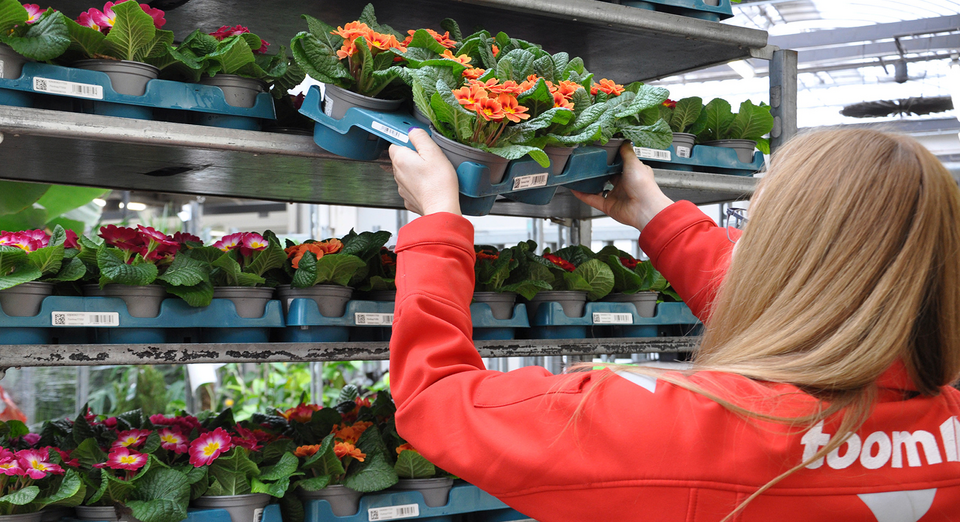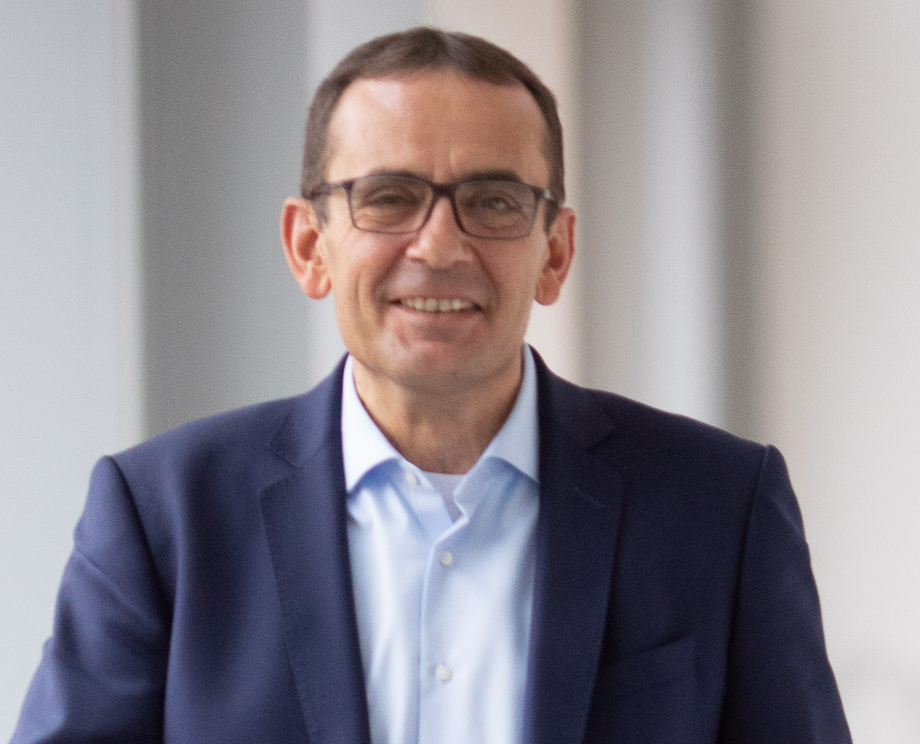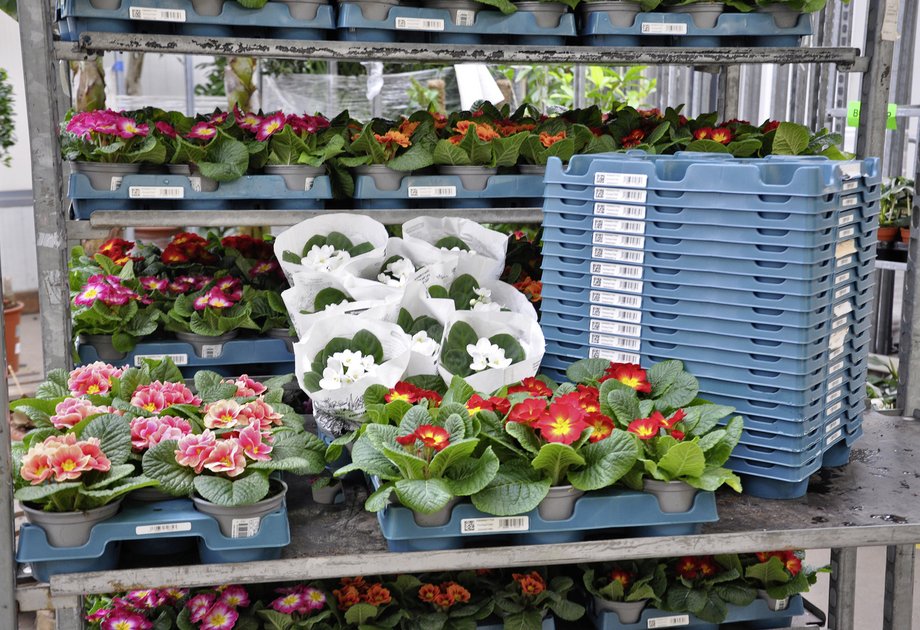
One and a half years ago, toom started with 60,000 Floritray pallets for transporting plants, and there are now a further 300,000 of these in all toom stores. With the expansion of the more sustainable reusable industry solution, up to 202 tonnes of plastic can be saved per year. toom managing director Dominique Rotondi takes stock and gives an outlook.
Since April 2022, toom has been the first in the industry to use the Floritray reusable solution for plant transport. The project, which toom piloted with 60,000 pallets, will be expanded by 300,000 pallets for a further pot size from the end of August.
Reusable solutions will also determine the future in the green sector. Where plants were previously transported in disposable pallets, which were ultimately disposed of as plastic waste, the cycle can now be closed with the Floritray reusable pallet. In addition to plastic waste, this also saves CO2 emissions.
For toom, reducing plastic waste and closing material cycles are key aspects of its sustainability strategy. This is why toom has been committed to more sustainable development in the garden centre and DIY store industry for many years.
 Dominique Rotondi, Managing Director for Purchasing and Logistics at toom
We spoke to Dominique Rotondi, Managing Director for Purchasing and Logistics and responsible for the sustainability commitment at toom Baumarkt DIY store.
Dominique Rotondi, Managing Director for Purchasing and Logistics at toom
We spoke to Dominique Rotondi, Managing Director for Purchasing and Logistics and responsible for the sustainability commitment at toom Baumarkt DIY store.
one: Saving plastic and also improving the carbon footprint: That was your goal when you introduced reusable pallets at toom in 2021. How is your balance sheet after two years - have you achieved your goal?
Dominique Rotondi: That's right, we are acting true to the motto "Avoid, reduce, improve", and the reduction of plastic waste is of course a central aspect of our sustainability management. After all, we all know that global plastic production continues unabated and is only decreasing very slowly.
As a pioneer in the industry, we have tackled the issue of reusable garden products.
After a pilot phase in 2021, we really got started in April 2022 with around 60,000 pallets in 230 stores. We now offer a closed-loop system for plant pallets.
 Over 90 per cent of the plant pots at toom are recyclable, enabling the recycling of 450 tonnes of plastic. © toom
This will save us a significant amount of plastic. The total savings potential is around seven million one-way crates. With the 360,000 that will then be in circulation at toom, we can save 1.35 million disposable pallets per year. We will be able to say next year whether this will work out, but we are very optimistic.
Over 90 per cent of the plant pots at toom are recyclable, enabling the recycling of 450 tonnes of plastic. © toom
This will save us a significant amount of plastic. The total savings potential is around seven million one-way crates. With the 360,000 that will then be in circulation at toom, we can save 1.35 million disposable pallets per year. We will be able to say next year whether this will work out, but we are very optimistic.
one: What are the plans for the future?
Dominique Rotondi: The project, which we piloted with 60,000 pallets, has been expanded by 300,000 pallets this year. This also includes another pot size. We are now taking a look at how this is going and, at the same time, thinking about what other changes make sense.
one: Floritray is an industry solution, but is currently "only" available at toom.
Dominique Rotondi: Floritray is a tried-and-tested solution on the market and it's time for other companies in the sector to jump on board in order to generate added value for customers and the environment quickly and in a solution-orientated manner. We are convinced that Floritray fulfils all the requirements to become a reusable industry solution and we will continue to work towards this.
one: Does toom have further measures in place to reduce plastic waste, or are further measures planned?
Dominique Rotondi: When it comes to packaging, we focus on the three Vs mentioned above:
Avoid: Unnecessary packaging is omitted. For example, toom already saves 24 tonnes of plastic per year by not using plastic film for glued laminated timber.
Reduce: The amount of material used for packaging is minimised to the bare minimum. For example, we are replacing the plastic labels on houseplants with paper versions. The labels are half as heavy and we save 64 per cent of CO2 emissions per label.
Improve: Instead of crude oil-based plastic, toom is increasingly using packaging made from recycled plastic, for example. In 2021, for example, we started to switch our own-brand potting soils to films that consist of at least 80 per cent post-consumer recyclate that has already completed at least one life cycle. This packaging can also be recycled again, keeping the materials in the cycle.
But there are even more examples of how toom is managing to make its packaging more environmentally friendly and sustainable: Switching to grass paper for beneficial insect-friendly seeds saves up to 34 per cent CO2. Over 90 per cent of our plant pots are recyclable, enabling us to recycle 450 tonnes of plastic. In addition, the pots contain at least 50 per cent post-consumer recyclate.
one: Thank you very much for the interview.
